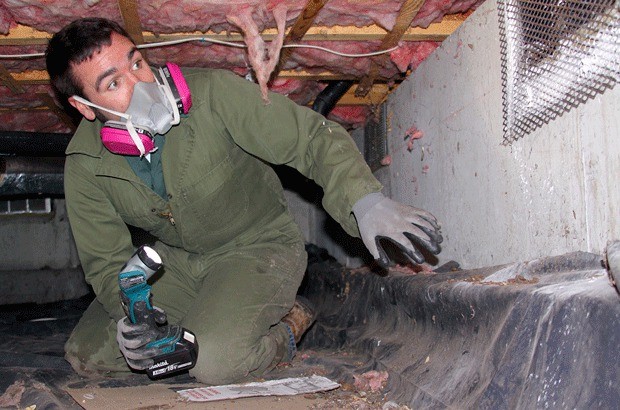Only moments after slipping through a crawl space of an Oak Harbor home, Robert Coleman is greeted by a shiny dark spider dangling from a web.
“Hey look, a faux black widow,” Coleman said, pointing a flashlight at it.
The spider isn’t crazy about being in the spotlight as it quickly retreats toward a place to hide. It’s also not crazy about the confusion over how much it resembles its western black widow cousin, minus the red hourglass-shaped marking on its abdomen.
False black widows, also known as steatoda spiders, are mostly harmless. Yet sightings of these and other spiders crawling and hanging around Whidbey Island residences are generally what keeps Coleman busy running his pest control business during the fall months when temperatures start to drop.
“This time of year, I get called out for spiders,” said Coleman, who operates Absolute Pest Control from Oak Harbor.
“People don’t like to see spiders up against a house or don’t want to walk into webs every morning.”
People’s fear of spiders, also known as arachnophobia, is well documented, inspiring Halloween decor and even a Hollywood movie.
Such fears are heightened in the fall when spiders are more visible and encounters more frequent because they are trying to escape the cold.
“People freak out over things with six legs,” said Tim Lawrence, director of Island County’s Washington State University Extension.
“When there are eight legs, it’s even worse.”
Lawrence, who holds an undergraduate degree in entomology, thinks that spiders get a bad rap and are often misunderstood.
Only three venomous spiders that pose a medical concern to most humans are found in Washington state, and two of them are most commonly encountered east of the Cascade Mountains.
When Lawrence gets a phone call in his Coupeville office about a spider, which happens frequently, the spider in question is often the victim of mistaken identity.
People will bring in specimens in jars, believing they have the more toxic hobo spider or brown recluse spider when all they generally have is the harmless giant house spider.
Brown recluse spiders aren’t found in Washington, while hobo spiders are encountered throughout the state.
“Usually, I end up taking them outside and letting them go,” Lawrence said.
The hobo joins the western black widow and yellow sac spider as the arachnids in Washington that have enough venom in their bites to warrant medical concern, though Lawrence has never encountered any of them on Whidbey.
But it’s not just the thought of a spider bite that makes people’s skin crawl.
Their sticky webs and creepy, crawly features such as bulbous abdomens and long legs don’t help their cause and result in phone calls to Coleman and other pest control operators.
Elena Geyman, 24, who’s stationed at Whidbey Island Naval Air Station, said she used to pick up spiders as a child but not anymore.
“I guess it’s just the mystery of them,” Geyman said. “You don’t know if specifically they’re poisonous or if they’ll jump at me.”
“We tend to fear what we do not know,” said Joseph Sheldon of Coupeville, who has a doctorate’s degree in entomology. “Fear also has many cultural features. Snakes and spiders fall into the same category in the sense that a few species are potentially harmful and we tend to generalize our fear.”
Nearly 1,000 species of spiders are known in Washington, with a hundred or more probably existing on Whidbey, Sheldon said.
A study by Robert Pratt and Melville Hatch, published in 1938 in the Journal of the New York Entomological Society, describes the existence of black widow spiders in Coupeville on a steep, grassy slope that is “well-drained and exposed to the sun” on the island’s west side.
Al Sherman, a retired farmer on Ebey’s Prairie, said he doesn’t remember seeing black widows near the bluff in his decades of farming but wouldn’t be surprised considering the unique plant life and other conditions that have existed there.
Coleman said he’s never spotted a western black widow in his seven years of pest control on the island, but he’s often seen its more innocent relative. He’s had to deal with hobo spiders as well.
Killing spiders is not something Coleman particularly likes but finds it necessary when a customer considers them enough of an issue that they seek his services.
He respects that spiders have a beneficial role in the ecosystem.
“They’re pretty harmless,” he said of most spiders. “When it comes to them being a nuisance or a pest that people don’t like, then it becomes a problem.”



